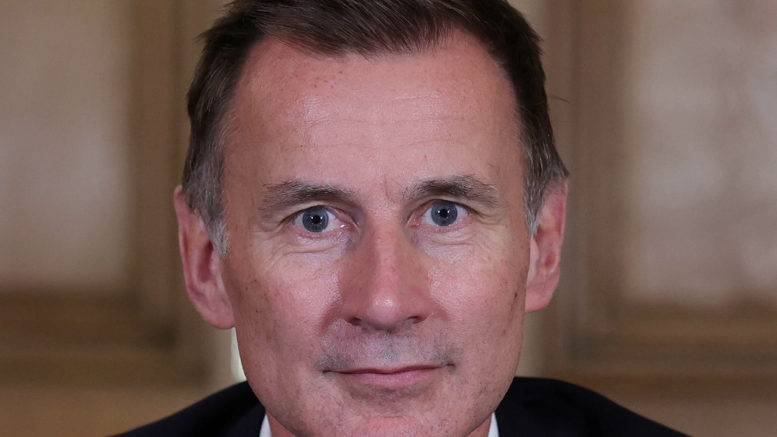Chancellor Jeremy Hunt had forewarned that his Autumn Statement would include the results of some ‘hard decisions’ and he wasn’t wrong.
Acting to shore up the country’s battered economy, his plan ‘to restore stability to the economy, protect high-quality public services and build long-term prosperity for the United Kingdom’ made tackling inflation its top priority.
This, he said, is now forecast to be 9.1 per cent this year and 7.4 per cent next.
The Office for Budget Responsibility had confirmed that the measures within the Autumn Statement will ‘help inflation to fall sharply from the middle of next year’.
Those measures included ‘a consolidation of £55bn’, Treasury speak for tax increases and public spending cuts.
One surprise was a comment on Stamp Duty. ‘The OBR expects housing activity to slow over the next two years, so the stamp duty cuts announced in the mini-budget will remain in place but only until 31st March 2025’, said Hunt.
‘After that, I will sunset the measure, creating an incentive to support the housing market and all the jobs associated with it by boosting transactions during the period the economy most needs it’.
The tax increases included more from Income Tax, Corporation Tax and a Windfall Tax on energy generators.
Income tax rises will not arise from any change of rates but from a freezing of personal allowances – which, given continued inflation and concomitant wage increases, is as good as a tax increase – and lowering of the higher rate tax band.
The threshold at which higher earners start to pay the 45p rate will be reduced from £150,000 to £125,140, while Income Tax, Inheritance Tax and National Insurance thresholds will be frozen for a further two years until April 2028. The Dividend Allowance will be reduced from £2,000 to £1,000 next year, and £500 from April 2024 and the Annual Exempt Amount in capital gains tax will be reduced from £12,300 to £6,000 next year and then to £3,000 from April 2024.
The threshold for employer National Insurance contributions will be fixed until April 2028, but the Employment Allowance will continue to protect 40 per cent of businesses from paying any NICS at all.
And as confirmed last month, the main rate of Corporation Tax will increase to 25 per cent from April 2023.
Sweeteners included action to protect ‘the most vulnerable’ including a £26bn support package including continued energy price support and 10.1 per cent rises in benefits and the State Pension and an increase of 9.7 per cent in the National Living Wage.
More than eight million households on means-tested benefits will receive a cost-of-living payment of £900 in instalments, with £300 to pensioners and £150 for people on disability benefits.
The Energy Price Guarantee, will continue to provide support from April 2023 but with the cap rising to a level which should mean increases paid by the average household will be limited to £3,000 (currently £2,500).
The Chancellor also announced a £13.6bn package of support for business rates payers in England. To protect businesses from rising inflation the multiplier will be frozen in 2023-24 while relief for 230,000 businesses in retail, hospitality and leisure sectors was also increased from 50 per cent to 75 per cent next year.
To help businesses adjust to the revaluation of their properties, which takes effect from April 2023, the Chancellor announced a £1.6bn Transitional Relief scheme to cap bill increases for those who will see higher bills. This limits bill increases for the smallest properties to 5 per cent. Businesses seeing lower bills as a result of the revaluation will benefit from that decrease in full straight away, as the Chancellor abolished downwards transitional reliefs caps.
Small businesses that lose eligibility for either Small Business or Rural Rate Relief as a result of the new property revaluations will see their bill increases capped at £50 a month.
Many of the tax and spending decisions apply in Scotland, Wales and Northern Ireland. As a result of decisions that do not apply UK-wide, the Scottish Government will receive around an additional £1.5bn over 2023-24 and 2024-25, the Welsh Government will receive £1.2bn and the Northern Ireland Executive will receive £650m.
Further information is included in:
• Cost of Living Factsheet
• Business Rates Factsheet
• Energy Taxes Factsheet
• The Autumn Statement 2022 Speech
• Find a Business Rates Valuation Service
Early industry reaction to the Autumn Statement include:
* James Poyser, CEO of Provestor, a specialist online accountancy for property investors and landlords: ‘Landlords everywhere will be breathing a sigh of relief after today’s budget. There was a lot the Government could have directed at the property sector to make up the deficit but in the end those measures weren’t forthcoming.
‘Today’s inflation and interest rates mean rental rather than ownership will continue to remain the only option for many people. The package for low earners, which will go some way to helping people afford energy bills and rent, will bring some stability to tenancies’.
But: ‘The plan for introducing Making Tax Digital for landlords wasn’t adjusted or cancelled. The £10,000 income threshold remains, and the date to introduce it is still April 2024. Currently, 1.4m landlords are in scope. However, with inflation and interest rates as they are, landlords may need to make adjustments to rental rates and this could tip up to 100,000 landlords who previously wouldn’t have qualified for MTD over the £10,000 theshold and into scope’.
* Jason Harris-Cohen, managing director of professional cash buyer, Open Property Group: ‘Today’s budget was bleak and full of austerity, but I think the Chancellor made a reasonable start on trying to stabilise the economy and hopefully, regain confidence for global investors in the UK following the dismal mini budget by Jeremy Hunt’s predecessor.
‘It was inevitable that there would be vast tax rises and capped thresholds, which will be capped for longer and will not rise with inflation, essentially eroding the value of our income in real terms.
‘The extension to the energy support scheme and cap rise is good news from a cost-of-living perspective and the ongoing Stamp Duty holiday should go some way to keeping property activity moving.
‘The measures taken will hopefully lead to lower mortgage lending rates too, which is positive for aspiring homeowners who may also benefit from falling property prices next year. Similarly, this will help people who will be re-mortgaging. According to UK Finance, the massive increase in property sales after the lockdown will mean 1.8m homeowners will see their fixed-rate mortgage deals expire in 2023.
‘For landlords, however, the increase in personal taxes in the form of dividend and Capital Gains Tax will be another blow. Many financed landlords are already struggling to make a profit from their rental properties, and this may bring forward their plans to sell ahead of April 2023.
‘This isn’t great news for supply or rents, with rents already at an all-time high, and available stock levels declining. The rise in the National Living Wage and cost of living payments will go some way to support lower income families, but will only make up a fraction of their increasing living costs’.
* Jeremy Raj, national head of residential property at Irwin Mitchell: ‘It appears that once again the Chancellor of the day has been unable to resist tinkering with stamp duty. However, there will be relief within the industry and for many buyers that all he has done is to stretch out the September “cuts” until the end of March 2025, and there is nothing new or more complex to contend with. The industry will this time round be much more focused on how the markets react, and – ultimately – whether the cranking up of interest rates will continue apace. Frankly, given the ups and downs of recent times, many will question this Government’s ability to say what will be happening in March 2023, let alone in 2025, but there will be some sighs of relief from those currently mid-transaction that they will still be paying what they expected in SDLT’.
* Sarah Coles, senior personal finance analyst at Hargreaves Lansdown: ‘Property buyers will have been thrown into a quandary by the announcement on stamp duty. Right now, the market is sending out every possible signal that they might want to hang fire, because we could be reaching the peak. So it will make their decisions even harder now that Jeremy Hunt has warned them if they wait too long, they’ll end up paying more stamp duty.
‘This could end up providing a useful short-term boost to the market. By moving from an open-ended stamp duty cut to a limited opportunity, it could hurry through more sales, and help to keep the market ticking over until March 2025, when there’s a reasonable chance we will be out the other side of the recession.
‘However, this may not be the best outcome for buyers. The desire to save tax could force them to buy sooner than they otherwise would, and expose them to the risk of property price drops. Meanwhile, if they decide to hold on for the bottom, they could end up rushing for the end of the stamp duty break along with so many others that they end up paying over the odds.
‘Buyers already have incredibly tough decisions right now, and this announcement won’t have made it any easier’.
* Emma Hayes, managing director of Platinum Property Partners: ‘We welcome the Chancellor’s ambition to balance the books and target stability and growth whilst combating inflation. However, the announcements made in today’s budget have dealt yet more blows to private landlords, which will undoubtedly have an impact on tenants and only push rents up.
‘At a time when the cost of investing in and managing rental properties is already at an all-time high, imposing additional tax liabilities will further deter the additional supply of much needed buy-to-let homes.
‘Cuts to dividend allowances and the already confirmed u-turn on Corporation Tax reduction will hurt limited business landlords the most, who have restructured their businesses to combat the reduction in mortgage interest tax relief introduced in 2017. And the cuts in the Capital Gains Tax allowance to £6,000 next year and £3,000 the following year could be catastrophic for cash-strapped landlords who are selling non-profitable rental properties.
‘The measures could cause a mass exodus of smaller landlords in the coming months as they try and sell before the CGT cut comes into effect, which will put a downward pressure on prices but an upward pressure on rents as supply diminishes.
‘The government seems to forget that the majority of landlords are not the wealthiest, but in fact middle-class, hard-working individuals who are struggling to make ends meet like a lot of the nation. Those who rely on rental income to live may now need to seek other income sources, and at a time when unemployment is rising too.
‘Although the extension to the energy price cap will go some way towards combating all-inclusive property management costs and borrowing rates may stabilise, the property market will likely only attract investment from the cash-rich’.
* Matt Cowen, senior associate at the law firm Winckworth Sherwood: ‘The Government has today confirmed that next year’s social housing rent increases will be capped at 7 per cent. No doubt there remain tough times ahead for many social housing tenants squeezed by the cost-of-living crisis, but the introduction of this rent cap will partly mitigate the 11.1 per cent rent increases that would have otherwise taken effect from next April.
‘Social housing landlords also face their own financial pressures, particularly in relation to meeting development targets and decarbonisation commitments. They will need to consider how this cap on their main source of income impacts those plans whilst ensuring, as far as possible, that a reduced income does not lead to less and lower quality housing stock over the medium to long term. This requires careful consideration and, in some cases, will involve RP boards making difficult trade-offs.
‘It should also be remembered that the rent cap announced today does not apply to shared ownership rents or private sector rents’.







